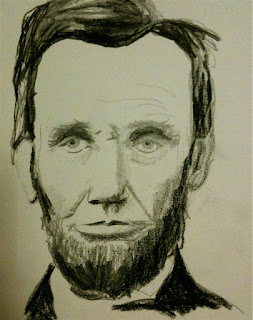Andrew Johnson
(Dec. 29, 1808, Raleigh, NC - July 31, 1875, Carter Station, Tennessee)
(Dec. 29, 1808, Raleigh, NC - July 31, 1875, Carter Station, Tennessee)

- Mr. Johnson was the first president to be impeached; he was the first and only president who had never gone to school (he was a tailor by training); he was the first president to grant a reporter a formal interview; and he was the first and only former president to serve as a Senator (he ran and won in 1874, six years after his term as president ended).
- Even though Johnson was a completely self-taught man (well almost completely--his wife taught him arithmetic and how to write), he diligently worked his way up the political ladder: from town alderman in Greenville, Tennessee, to the Tennessee House of Representatives, to Governor of Tennessee, to U.S. Senator, to Military Governor of Tennessee during the Civil War and finally to Vice President in Lincoln's second term (though notably Johnson owned 8 slaves, often advocated a "middle ground" on the slavery issue--sort of like being "kind of pregnant" or "very unique"--, and he was a Democrat on the Republican ticket). The World Book account of Johnson's inauguration bears quoting directly:
He had recently recovered from an attack of typhoid fever, and was still weak. On his way to the ceremony in the Senate, Johnson stopped to rest. He drank some whisky, thinking it would strengthen him. In the heat of the Senate chamber, and because of his weakened condition, Johnson became tipsy. His jumbled speech embarrassed even his friends. For many years, Johnson's opponents accused him of drunkenness, but the accusation was unjustified. Lincoln remarked: 'I have known Andy for many years; he made a bad slip the other day, but you need not be scared. Andy ain't a drunkard.'
- The morning after Lincoln's assassination, Johnson took the oath of office in his hotel room. In the four-year term that followed, he fought Radical Republicans intent on punishing the South. This resistance led to his tremendous unpopularity and eventual impeachment (though the Senate acquitted him in the impeachment trial). One of his lawyers at his impeachment trial wrote: "He is a man of few ideas, but they are right and true, and he could suffer death sooner than yield up or violate one of them." How's that for a backhanded compliment! During the trial, Radical Republican voters threatened Senators who did not vote in favor of impeachment. One voter, for example, warned, "Any Republican Senator who votes against impeachment need never expect to get home alive." My, my. Politics can get quite ugly.
- During Johnson's presidency, the U.S. acquired Alaska from Russia for $7.2 million in 1867. The deal was negotiated by Secretary of State William Seward--many American called Alaska "Seward's folly" for years thereafter. Recently, Discovery confirmed that it had finalized a deal with Sarah Palin to do an eight-part travelogue show about her home state. Although the series is not yet in production, the cost is estimated at about $1 million per episode. So that would be about $8 million. I can do math.

